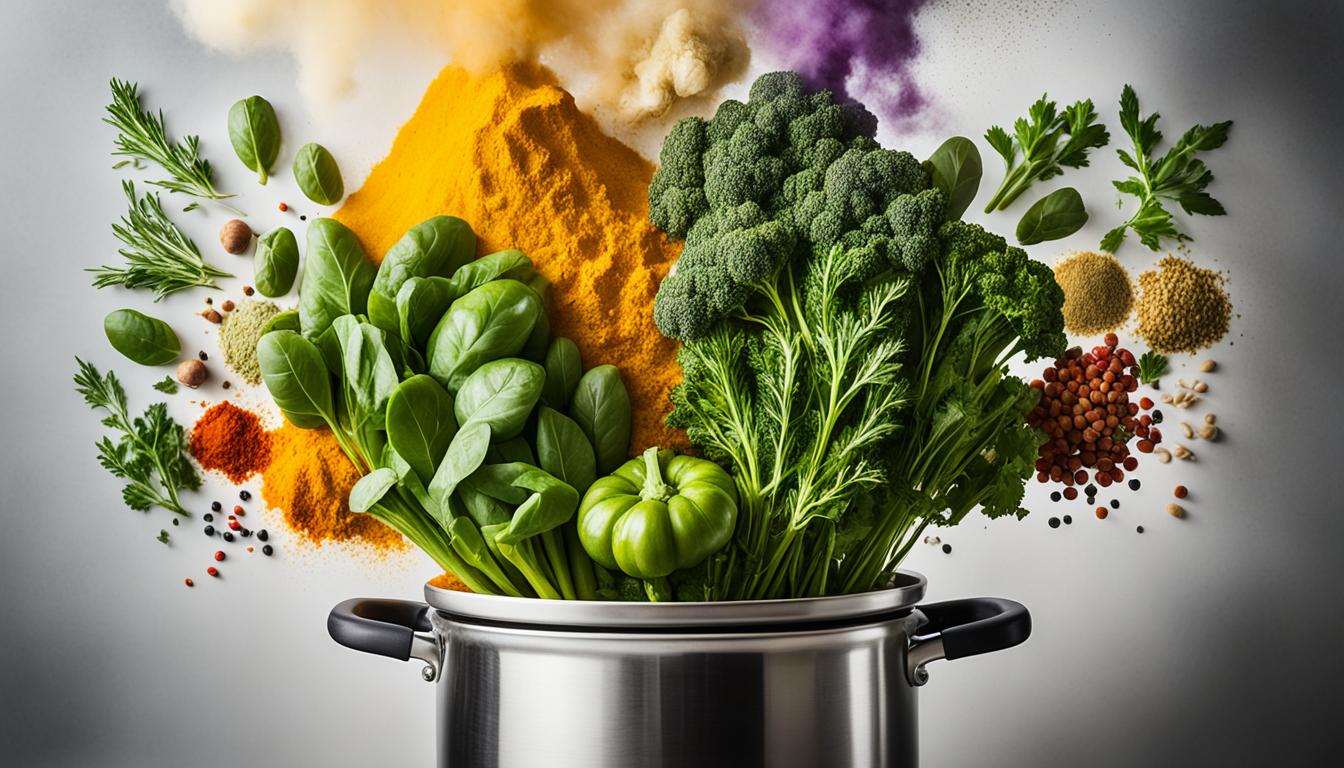Looking for a tasty and healthy way to boost your health? The souping diet is your answer! It’s a diet trend centered on enjoying mainly soups to nourish and clean your body. It offers a yummy twist to normal meals and brings many benefits to your well-being.
Souping has become popular as a soup cleanse. It’s a simple and delightful way to lose weight, boost your immune system, make digestion better, and raise your energy. You use nutrient-packed ingredients like veggies, herbs, and spices in souping. This gives you key vitamins, minerals, and antioxidants, making it a smart choice for a healthier life.
People have been making soups since ancient times to use ingredients wisely and save resources. Nowadays, souping is a global wellness movement. It mixes health-focused eating with exciting cooking.
Wondering about souping? It’s easy! Just replace regular meals with various soups such as broths, purees, and detox soups. These tasty mixes offer lots of nutrients and a comforting eating experience.
Souping can be tailored to fit your unique needs and likes. It doesn’t matter if you want a quick cleanse or a lasting diet change. Souping can fit into your lifestyle. You just need to find the right way for you.
Key Takeaways:
- Souping is a dietary trend that involves consuming primarily soups to nourish and detoxify the body.
- The benefits of souping include weight loss, improved immunity, better digestion, and increased energy levels.
- Souping has a long history and has evolved into a wellness trend embraced by different cultures globally.
- Souping works by replacing regular meals with various types of soups, such as broths, purees, and detox soups.
- Customization is key when it comes to souping—find the approach that suits your needs and preferences.
What is Souping?
Souping is a diet that focuses on eating mostly soups. This method is different from traditional diets that limit foods. Souping uses tasty, nutritious soups for essential nutrients. These help with weight loss, immune boost, better digestion, and more energy.
Souping is great because it’s easy. You can make soups ahead of time and eat them all day. This makes healthy eating simple, even for busy people. Plus, soups have many flavors and textures. You can enjoy eating well.
For weight loss, souping is useful. It swaps heavy meals for soups full of nutrients. This cuts down calories but keeps you full. Soups also have lots of water. This helps you feel full and stops you from eating too much.
Soups are packed with health benefits. They have fresh veggies, herbs, and spices. These are full of vitamins, minerals, and antioxidants. They help your health and happiness.
Souping lets you eat many ingredients. You get lots of different nutrients. Soups can have greens, colorful veggies, lean proteins, and grains. You can tailor soups to your needs and likes.
Souping is also good for digestion. Warm, liquid soups can calm the digestive system. This helps your body break down and take in nutrients better.
Souping is a fun, flexible way to live healthily. Adding soups to your diet gives you nutrients, helps lose weight, strengthens immunity, and aids digestion. Whether you want a quick cleanse or a lasting diet change, souping is tasty and healthy.
The History of Souping: From Ancient Times to Modern Trends
Souping has a long history, crossing cultures and centuries. It began as a way to enjoy diverse ingredients. Over time, it changed, yet stayed a tasty, healthy way to eat.
In the past, soups helped make food last longer and added nutrition. The Greeks, Romans, and Egyptians all enjoyed soups. They mixed meats, veggies, and herbs for a filling meal.
Souping stayed popular through history in many places. In Asia, China and Japan crafted soups with unique flavors and health benefits. European soups were important in the diets of the medieval and Renaissance periods. And, African and Latin American soups featured local tastes and spices.
The modern focus on health has made souping even more popular. It’s a great way to eat more veggies, beans, and grains. Souping has moved from simple to creative and mindful eating.
Today, many people choose souping to stay healthy. They do soup cleanses or eat soup every day. This helps them feel better and try new tastes. Souping combines tradition, good nutrition, and delicious flavors.
The story of souping shows human creativity with food. From old times to today, souping has been loved. It brings joy and health to our tables.
How Does Souping Work?
Souping is a way of eating where you have nourishing soups instead of regular meals. These soups are made from fresh veggies, herbs, and spices. They are full of flavor and good for you. Souping lets you pick what you like, so it fits anyone’s diet, whether for a quick cleanse or a long-term plan.
With souping, you can mix different recipes and ingredients to make tasty soups that help you feel great. It’s perfect if you want more energy, better digestion, or just to feel healthier. Souping is a yummy and good way to take care of your body.
The Souping Process
When you soup, you swap one or more meals each day with filling soups. Choose fresh, whole foods to get the most nutrition. Including veggies, herbs, and spices makes your soup rich in vitamins and antioxidants.
Souping is flexible. You can try a soup cleanse or just add soups to what you eat normally. Either way, you get to make your meals how you like them. And, you get to try many tasty flavors.
Souping is a fun, flexible way to meet your health goals. With nutrient-rich soups, you nourish your body and enjoy great ingredients.
If you’re thinking about trying souping, it’s key to listen to your body. Always talk with a dietitian or doctor before big diet changes.
Benefits of Souping for Nourishment
Souping is great for your body. Eating soups made with fresh veggies, herbs, and spices gives you important nutrients. These help your health and happiness.
- Promotes weight loss: Soups can be low in calories which helps with managing how much you eat. This is good for losing weight steadily.
- Boosts immunity: Soups have lots of vitamins and antioxidants. They help keep you from getting sick.
- Supports digestion: Soups are high in fiber. This helps your digestion and prevents tummy troubles.
- Increases energy levels: Soups give you a constant energy boost. They keep you moving all day.
Whether it’s for a short cleanse or a long-term diet, souping is a tasty, nutritious way to reach your health objectives.
Different Types of Souping: Broths, Purees, and Detox Soups
Souping comes in various styles, such as broths, purees, and detox soups. Each kind has its unique tastes and health gains. They make your souping journey exciting and varied.
Broths
Broths involve simmering bones, veggies, and herbs for a long time. This makes a flavorful liquid full of nutrients. It’s a way to draw out the goodness from the ingredients, creating a healing drink. Broths form the base of many soups. They give you amino acids, minerals, and collagen. This helps with joint health and a happy gut. They’re ideal for anyone wanting a warm and comforting soup.
Purees
Purees are made by blending cooked vegetables until smooth. They offer a creamy and filling meal. Plus, they’re easy to digest and let your body quickly take in nutrients. You can tailor purees to fit your taste and needs, making them flexible. They’re perfect for eating lots of veggies in a tasty, nutrient-rich meal.
Detox Soups
Detox soups aim to cleanse your body with ingredients like leafy greens and detoxifying herbs. These soups are flavorful and full of health benefits. The special ingredients help get rid of toxins, support your liver, and strengthen your immune system. Eating these soups can help you feel better and manage your weight.
No matter your preference – broths, purees, or detox soups – you’ll find a soup that matches your taste and health needs.
Smoothie & Juice Souping
Smoothie & juice souping is a tasty and healthy way to use drinks and soups as meal replacements. These meals are made with lots of ingredients like leafy greens, fruits, veggies, herbs, spices, and superfoods. They provide many flavors and are full of nutrition.
With smoothie & juice souping, you get to eat a bunch of whole foods every day. This helps you stay in tip-top shape. By blending fresh stuff into drinks and soups, eating well becomes easy and fun.
Picture kicking off your day with a green smoothie that’s full of leafy greens, fruits, and good fats. Such a mix is packed with vitamins, minerals, and things that help your health. For a quick boost in the afternoon, a cool juice with fruits and veggies can perk you right up. At dinner, a hearty soup with lots of vegetables and protein makes you feel full and happy.
By trying smoothie & juice souping, you get to enjoy lots of tastes and ensure your body gets what it needs.
This way of eating focuses on eating foods packed with nutrients. Smoothies and juices give you heaps of vitamins, minerals, and plant nutrients in an easy-to-absorb way. Blending or juicing breaks food down, so your body gets more out of it.
Plus, it’s an easy way to eat lots of superfoods. You can include greens like kale and spinach, berries full of antioxidants, and spices like turmeric and ginger that heal.
Benefits of Smoothie & Juice Souping
Smoothie & juice souping comes with many perks for your health:
- It helps detox your body with natural fiber and water from smoothies and juices.
- Makes it easier for your body to take in and use nutrients, thanks to blending or juicing.
- Gives you a natural boost in energy from all the nutrient-rich ingredients.
- Helps with managing weight by controlling portion sizes and lowering calorie intake.
- Supports a healthy gut by providing plenty of fiber from fruits and vegetables.
Smoothie & juice souping is a fun and versatile way to keep yourself nourished. It supports your overall health whether you make it a daily habit or try a cleanse. Remember to listen to your body and adjust the souping to fit your needs and likes.
Souping for Gut Health: Nourishing Your Digestive System
Souping nourishes your body and supports gut health. It provides nutrients that help digestion. This is good for our overall health.
For gut health, include ingredients like bone broth. Bone broth has amino acids and collagen. It helps soothe the gut and reduce inflammation.
Adding fiber-rich vegetables is also key. Vegetables like kale, broccoli, and carrots add bulk to stools. They help prevent constipation and support good bacteria in the gut.
Souping can ease digestive discomfort and boost digestion. Soups are easy to digest and help absorb nutrients. This is great for those with digestive issues or recovering from illness.
Try souping to improve your digestive health. Use bone broth and high-fiber vegetables in your soups. Enjoy the benefits of better digestion.
The Benefits of Souping for Gut Health
- Promotes efficient digestion and nutrient absorption
- Reduces inflammation in the gut
- Aids in healing and repairing the intestinal lining
- Supports a healthy balance of gut bacteria
- Prevents constipation and promotes regular bowel movements
- Alleviates digestive discomfort
Souping is a tasty, healthy way to boost gut health. By choosing soups with the right ingredients, you support digestion and well-being.
Souping for Weight Loss: Fact or Fiction?
Souping has become popular as a weight loss solution. However, it’s key to be cautious and keep expectations real. While soups can help control portions and cut calories, diets that over-restrict can be hard to keep up. The success of souping for weight loss can vary among individuals.
Substituting high-calorie meals with soups full of nutrients can help create a calorie deficit. Soups offer a nice mix of carbs, proteins, and fats. They also pack in fiber, which helps you feel full and curb cravings.
Yet, relying only on soups may not tackle habits that lead to weight gain. A balanced weight loss plan includes diverse foods, exercise, and lifestyle changes. True weight loss comes from steady, small changes, not quick fixes.
“Souping can enhance a balanced diet and a full approach to losing weight. It offers tasty, nutrient-rich meals without too many calories. But, it’s crucial to aim for long-term lifestyle changes over just souping for weight control.”
Thinking of trying souping for weight loss? Talk to a health expert or a dietitian first. They can offer advice that fits your personal health needs and goals. They’ll help you see souping as part of an overall healthy diet.
Remember, reaching a healthy weight is about balance. It involves eating well, enjoying your food, and being mindful of your habits. Soups can help, but they’re only one part of achieving your weight goals.
Souping can work for weight loss if it’s part of a bigger plan. By adding nutritious soups to a balanced diet and living well, you can reach your weight loss targets in a healthy, satisfying way.
Understanding the Nutritional Value of Souping
Souping offers tasty and easy meals, full of nutrients. It blends vegetables, legumes, grains, and proteins into healthy dishes. It’s a great way to eat well and stay healthy.
Nutrient-Rich Ingredients
Imagine your soup bowl filled with colorful veggies and proteins. Souping lets you mix carrots, bell peppers, lentils, and chickpeas. Add quinoa or buckwheat for fiber and energy.
Lean proteins like chicken or tofu boost the soup’s benefits. They help in muscle repair and building.
A Balanced Approach
To make balanced soups, pick ingredients wisely and watch portions. Variety in vegetables provides essential vitamins and keeps your gut healthy. This helps you feel full and happy.
Mixing vegetables with grains offers steady energy. These carbohydrates fuel your day without sudden drops.
Adding proteins to your soup makes it nutritious and filling. This mix helps keep your blood sugar stable, avoiding energy lows.
The Benefits of Souping
Souping comes with many perks for your health. Eating veggies, grains, and proteins can:
- Boost your immune system
- Improve digestion and gut health
- Keep your energy up
- Help with weight management
- Lower risk of chronic diseases
With souping, you get delicious meals plus vital nutrients. Mixing in a variety of healthy foods makes soups both nutritious and enjoyable.
| Nutrients in Souping Meals | Examples |
|---|---|
| Vitamins | Carrots, bell peppers, spinach |
| Minerals | Kale, lentils, quinoa |
| Antioxidants | Tomatoes, broccoli, turmeric |
| Fiber | Chickpeas, black beans, brown rice |
| Protein | Chicken, tofu, salmon |
Understanding souping’s benefits helps you create nutritious meals. You’ll enjoy the taste while giving your body what it needs.
The Science Behind Souping: How It Affects Your Body
Souping is more than just a food trend. It is backed by science for its health benefits. Studies show how soups can benefit us in many ways.
Hydration and Nutrient Support
Soups are mostly water, helping you stay hydrated. Being hydrated is key for your health. Soups are also full of nutrients from their ingredients. These include vitamins and minerals that help your body function well.
Comfort and Satisfaction
Soups offer a warm and smooth feeling that brings comfort. Eating them can make us feel full and happy. This helps control how much we eat. Doing so supports managing our weight.
“Soups offer a delicious and satisfying way to nourish your body. Their combination of flavors, nutrients, and textures can provide a comforting experience, making them a delightful addition to any well-balanced diet.” – Dr. Samantha Miller, Nutritionist
Ingredients in soups offer unique benefits. For example, bone broth in soups aids joint health. It might also improve skin. Soups with vegetables are high in fiber. This is good for digestion and a healthy gut.
Controlled Portion Sizes
Souping helps you manage how much you eat. Using soups as meal replacements helps control calorie intake. This is good for those wanting to lose or keep their weight. Souping offers tasty meals without overeating.
The science confirms souping’s health benefits. From keeping you hydrated to helping manage weight, soups are good for you. Adding tasty and nutritious soups to your diet is a smart way to be healthier.
Conclusion
Souping is a tasty and healthy choice for anyone. It’s perfect for a quick cleanse or a long-lasting diet plan. By trying different soups and ingredients, you make souping your own. This way, it’s easy to enjoy what you eat and get important nutrients.
But, be careful when you start souping. Think about your health and what you prefer to eat. It’s key to listen to how your body reacts. And, talk to a doctor if you need to. Adding souping to your diet can bring lots of taste and health benefits.
Souping can truly change your life for the better. It helps with losing weight, better digestion, and having more energy. So, pick up a spoon, mix up some new soup flavors, and enjoy the benefits. Souping is a great way to eat healthily.





